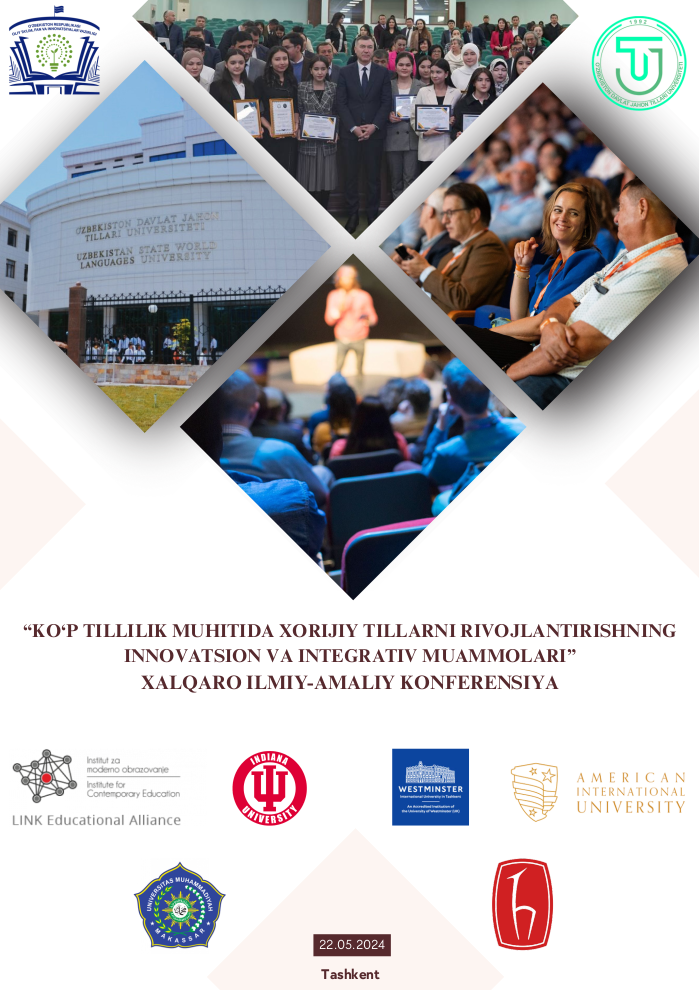The perspective on audiotory learners' assessment-for-learning for effective teaching in higher education
https://doi.org/10.5281/zenodo.11256007
Kalit so‘zlar
Assessment-for-learning, Speaking Fluency, Public Speaking, Perceptions, EFL StudentsAnnotasiya
This study looked into how students felt about assessment-for-learning when it came to improving their speaking fluency. the research sample consisted of twenty unismuh makassar students enrolled in the fourth semester. the sample consisted of twenty students. purposive sampling was employed to gather the sample. the study's conclusions show that unismuh makassar students in their fourth semester think it is advantageous to use an assessment-for-learning technique in their classroom settings. the overwhelming majority of students think assessment-for-learning improves their capacity to learn new material, motivation, and participation in class. this conviction is held by educators and learners alike. most students also believe that employing assessment as a learning technique can raise their level of satisfaction and make the teaching. the study also discovered that the largest obstacle for students was connection of the lesson because they were auditory learners. discussions also included the study's ramifications and suggested research directions.
Foydalanilgan adabiyotlar ro‘yhati
Brydges, Ryan, Marcus Law, Irene W. Y. Ma, and Adam Gavarkovs. 2022. “Licensure Activities in the Health Professions : A Call to Action.” 100–109.
Chung E., Norlina M. N., and Mathew V. N. 2020. “Are You Ready? An Assessment of Online Learning Readiness among University Students.” International Journal of Academic Research in Progressive Education and Development 9(1):301–17.
Junior, J. B. .. 2020. “ORIGINAL RESEARCH ARTICLE OPEN ACCESS ASSESSMENT FOR LEARNING WITH MOBILE APPS : EXPLORING THE POTENTIAL OF QUIZIZZ IN * João Batista Bottentuit Junior.” International Journal of Development Researchh 10(1):33366–71.
Kalleny, Nagwa. 2020. “Advantages of Kahoot! Game-Based Formative Assessments along with Methods of Its Use and Application during the COVID-19 Pandemic in Various Live Learning Sessions.” Journal of Microscopy and Ultrastructure 8(4):175–85.
Lecturer, The. n.d. The Lecturer’s Toolkit.
Melo, Grace, Diego Monteza, Greg Colson, and Yu Yvette Zhang. 2022. “How to Assess? Student Preferences for Methods to Assess Experiential Learning: A Best-Worst Scaling Approach.” PloS One 17(10):e0276745.
Rus, Dana. 2019. “Assessment Techniques in Teaching English for Specific Purposes to Engineering Students.” Procedia Manufacturing 32:368–73.
Sun, Lixuan and Adelina Asmawi. 2023. “The Effect of WeChat-Based Instruction on Chinese EFL Undergraduates’ Business English Writing Performance.” International Journal of Instruction 16(1):43–60.
Torres-Gordillo, Juan Jesús, Fernando Guzmán-Simón, and Beatriz García- Ortiz. 2020. “Communicative Competence Assessment for Learning: The Effect of the Application of a Model on Teachers in Spain.” PLoS ONE 15(5):1–16.
Wijaya, Agung Putra, Toto Nusantara, Sudirman, and Erry Hidayanto. 2023. “How Are Students’ Prior Knowledge Differentiate Analytical Thinking Process in Identifying the Convergence of Real Number Sequences?” International Journal of Instruction 16(1):205–18.
Yan, Qiaozhen, Lawrence Jun Zhang, and Xiaolong Cheng. 2021. “Implementing Classroom-Based Assessment for Young EFL Learners in the Chinese Context: A Case Study.” Asia-Pacific Education Researcher 30(6):541–52.
Yokoyama, Mai and Kazuhisa Miwa. 2021. “A Class Practice Study of Intervention Effect of Interactive Assessment on Learning Goal Orientation.” Frontiers in Psychology 12(August):1–9.
Al-fadl, M. M. A. (2018). Assessment for Learning Grammar versus Assessment of Learning Grammar for Preparatory Year Male Students. 12(3), 925–938.
Alonzo, D. (2016). Development and application of a teacher assessment for learning (AfL) literacy tool [PhD thesis, The University of New South Wales (UNSW)]. http://unsworks.unsw.edu.au/fapi/datastream/unsworks:38345/SOURCE02?view=true
Black, P., & Wiliam, D. (1998). Inside the black box: Raising standards through classroom assessment. Phi Delta Kappan, 80(2), 139–148.
BOSTES. (2016). Learning assessment: A report on teaching assessment in initial teacher education in NSW. NSW Government. https://educationstandards.nsw.edu.au
BROWN, H. D. (2003). LANGUANGE ASSESSMENT Principles and Classroom Practices (Fourth Edi).
Charteris, J., & Dargusch, J. (2018). The tensions of preparing pre-service teachers to be assessment capable and profession-ready. Asia-Pacific Journal of Teacher Education, 46(4), 354–368. https://doi.org/10.1080/1359866X.2018.1469114
Cahyo, S. D., Rijalul, M., Muslim, U., Rahman, A. N., & Pratolo, B. W. (2019). Needs analysis of Islamic-based English reading material for the Muhammadiyah junior high school. 8(2), 286–292. https://doi.org/10.11591/ijere.v8i2.18647
Christine, D. (2020). Utilizing the Teaching/Learning Cycle, Assessment for Learning and Talk, Read, Talk, Write Strategies to Improve Text Cohesion and Noun Phrase Expansion: A Case Study of a Long-Term English Language Learner (2020). School of Education Student Capstone Theses and Dissertations. https://digitalcommons.hamline.edu/hse_all/4488
Ismail, I., & Tini. (2020). MAJESTY : MASPUL JOURNAL OF ENGLISH STUDIES. 2(1).
Umar. (2018). The Impact of Assessment for Learning on Students’ Achievement in English for Specific Purposes A Case Study of Pre-Medical Students at Khartoum University: Sudan. English Language Teaching, 11(2), 15. https://doi.org/10.5539/elt.v11n2p15
Cherry Zin Oo et al (2023), Using a Needs-Based Professional Development Program to Enhance PreService Teacher Assessment for Learning Literacy

